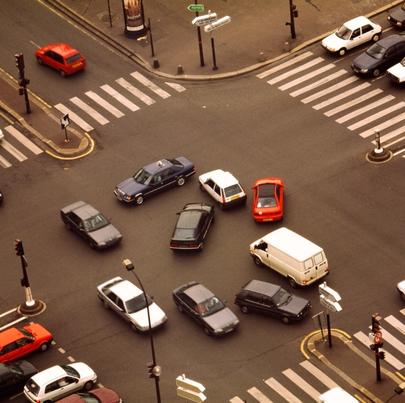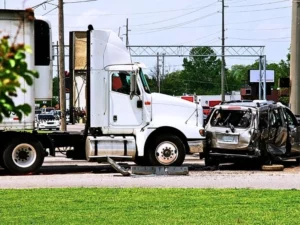Although laws don’t allow anyone the right-of-way, drivers must yield the right-of-way in certain traffic conditions. Failure to yield the right-of-way often leads to serious auto accidents. To create a safe traffic environment for cars, motorcyclists, bicyclists, and pedestrians, motor vehicle drivers are expected to obey right-of-way rules set forth by each state.

Right of Way Laws
Drivers are required to yield to the vehicle on the right or to others sharing the roads under specific conditions. When someone else is required to yield the right-of-way but fails to do so, drivers should stop or yield as necessary to prevent accidents. Right-of-way rules should be combined with common courtesy from all drivers.
According to law, right-of-way must be yielded to other drivers when there are yield signs, pedestrians in crosswalks, at uncontrolled intersections, and when turning left at traffic signals. The law also requires drivers to yield the right-of-way to emergency and construction vehicles with flashing lights and to school buses. School bus accidents seen by a car accident lawyer are commonly caused by cars that do not yield the right-of-way to the bus or stop when children are exiting the bus.
Intersections
Intersections include all cross streets, side streets, freeway entrances, and roundabouts. Uncontrolled intersections without traffic signals, stop signs or yield signs are especially dangerous for drivers. Since it’s impossible to predict the actions of other drivers, it’s important to pass through uncontrolled intersections with caution to reduce the possibility of collisions. Drivers should yield the right-of-way:
- To traffic on the through road at “T intersections”
- To the car on the right when arriving at a stop sign simultaneously with another vehicle
- When another vehicle reaches the intersection first
- When returning to traffic after the vehicle was stopped or parked
- To oncoming traffic when making a turn
- To pedestrians in marked crosswalks
When making right-hand turns, drivers should always yield to drivers who are going straight, check for bicyclists on the right, and check for pedestrians in crosswalks. When making left-hand turns, drivers should always yield to oncoming traffic, and to bicyclists and pedestrians crossing the street. When in roundabouts, drivers must yield to all drivers already in the circle and check for all pedestrians in crosswalks. When passing another vehicle on a narrow or winding uphill road or street, the driver going downhill should yield the right-of-way to the driver going uphill. The driver traveling downhill should pull over as soon as it is safe and let the uphill driver pass.
Illinois Right of Way Car Accidents
Intersections are prime locations for car accidents because drivers, pedestrians, bicyclists, and motorists are often coming from all directions and misinterpreting another person’s intentions or failing to recognize right of way rules of the road are common. Driving under the influence, texting or talking on a phone while driving, speeding and adverse weather conditions can all raise the risk for the right of way crashes at intersections and other locations.
Failure to yield crashes are fairly common in Illinois, and because they can occur under a variety of circumstances and at-fault drivers are often reluctant to admit any wrongdoing, complicated and sometimes confusing situations result for law enforcement officers, crash investigators, insurance companies and car accident lawyers. Since these types of accidents frequently cause traumatic brain injuries, broken bones, spinal cord injuries, paralysis and even death, they substantially alter the lives of crash victims and their families. Fortunately, there are steps drivers can take to ensure that the responsible party is held liable for the damages caused by failing to yield the right of way.
The Illinois Department of Motor Vehicles (DMV) recommends:
- Stopping the vehicle in a safe place away from traffic
- Checking and assisting any injured persons on the scene, if possible
- Calling 911 emergency services as soon as possible
- Exchanging personal information with other drivers involved in the accident
- Getting the name and personal information of any witnesses to the accident
All drivers involved in Illinois traffic accidents are required to file accident reports, when bodily injuries and/or fatalities result, and when property damage is more than $1,500. Drivers must file an accident report with the Illinois Department of Transportation within 10 days of the accident. Any driver involved in an Illinois car accident who fails to file an accident report as specified by law can face steep fines and/or time in jail. If a driver sustains injuries and is unable to file an accident report, any passengers in the car can file the report on the driver’s behalf.
If multiple vehicles are involved in the accident, all drivers should get a police report that describes specifics of the accident.







